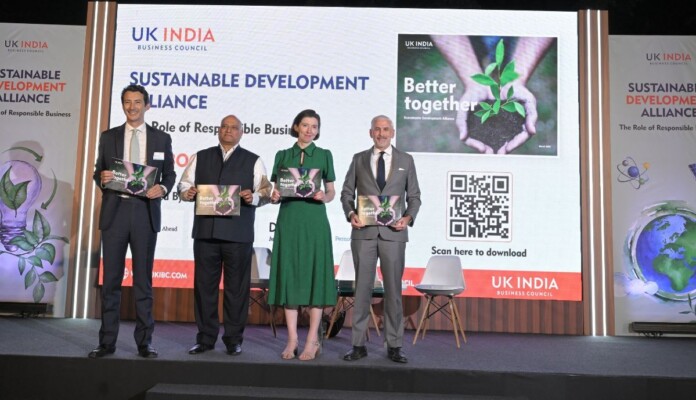
India and the United Kingdom have complementary approaches to sustainable development. Both countries consider businesses essential drivers of change. With an aim of a developed India – Viksit Bharat 2047, India is at a significant juncture — benefitting from a technology-driven transformation, infrastructure development, favourable demographics, a productive workforce, and consistently high economic growth. While economic growth matters, it is more important than ever that economies be designed for sustainable development.
Aligned with India’s vision, the UK India Business Council held its 6th annual Reception on Sustainable Development, titled “Sustainable Development – The Role of Responsible Business.
At the event, UKIBC launched its March 2025 edition of Better Together report. The report highlights India’s progress and pathways on the UN’s Sustainable Development Goals (SDGs) across national and state levels, and the contribution of businesses with a focus on British firms, as well as recommendations for greater collaboration on sustainable development.
India has made significant strides in improving across multiple UN SDG pillars, such as: Good Health and Well-being (SDG 3), Affordable and Clean Energy (SDG 7), Clean Water and Sanitation (SDG 6) and Sustainable Cities and Communities (SDG 11), amongst others.
The report highlights the Spillover Index evaluating how a country’s actions affect others. India has a Spillover score of 95.74 outperforming other BRICS nations such as China, Australia, Russia, South Africa and Japan. As India progresses towards its ambitious Viksit Bharat plan, it must sustain its momentum. Achieving developed nation status would necessitate, for instance, baseline accomplishments such as universal access to quality healthcare, achieving net-zero emissions, doubling per capita income, leading with industrial innovation, and eradicating extreme poverty.
India’s corporate social responsibility (CSR) laws require profitable businesses to contribute to societal goals, ensuring that corporate success benefits the wider community. However, UKIBC’s consultations with a sample size of UK companies in India indicate most are integrating SDGs into the core of their business operations and going beyond CSR commitments – working with partners across private sector, academia, government, and civil society. British firms are helping to drive sustainable development, from climate action and poverty reduction to improving education, health, and access to clean water and sanitation.
UK banks are investing hundreds of millions of pounds in clean mobility, energy infrastructure and related areas supporting India’s net-zero transition. Others, like universities and advisory firms, are helping deliver sustainability-driven solutions that are helping improve agricultural productivity and by extension, farmer incomes. British firms with expertise in research and innovation are providing skills and training for front-line healthcare workers as well as the next generation of responsible educators and skilled scientists. Leading manufacturing firms are ensuring positive environmental and social impact by helping embed eco-conscious practices across the supply chain, providing vocational education to enhance employment opportunities for under-represented communities.
In the report UKIBC makes strategic recommendations to enhance this partnership
- The UK and India must be partners of choice on net-zero, leveraging UK’s advanced technology ecosystem and India’s scale, expanding R&D collaborations that can be scaled for global impact.
- Jointly address SDG priorities like food security, healthcare, and inclusive growth by activating business-led platforms under the UK-India CEO Forum and Joint Economic and Trade Committee (JETCO).
- Create a progressive policy environment that helps unlock private sector investment for SDGs.
An enhanced iteration of UKIBC’s Socio-Economic Impact (SEI) campaign underway since 2019, the ‘Sustainable Development Alliance’ (SDA) was launched in 2023 to provide a platform for UK businesses, universities and other key stakeholders to progress the UN Sustainable Development Goals (SDGs) in India. The SDA provides a platform for convening policymakers, industry leaders, and like-minded stakeholders to drive dialogue, share best practices, and develop partnerships that enhance socio-economic impact in India.
Through SDA, UKIBC highlights the role of responsible business in accelerating SDG progress by:
- Facilitating greater dialogue and partnerships between businesses and government to drive collaborative action.
- Showcasing success stories and case studies of UK companies’ contributions to sustainable development in India.
- Providing intelligence on India’s SDG priorities and identifying areas where private sector participation can create maximum impact.








